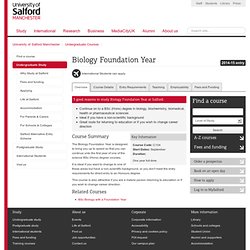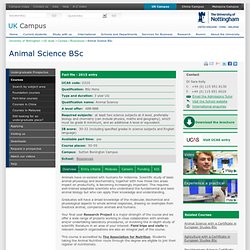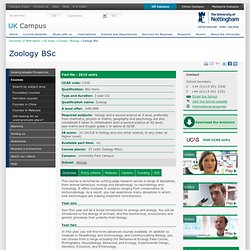

Biology Foundation Year. 3 good reasons to study Biology Foundation Year at Salford: Continue on to a BSc (Hons) degree in biology, biochemistry, biomedical, health or pharmaceutical sciences Ideal if you have a non-scientific background Great route for returning to education or if you wish to change career direction Key Information Course Code: C104 Start Dates: September Duration: One year full-time Course Summary The Biology Foundation Year is designed to bring you up to speed so that you can continue onto the first year of one of the science BSc (Hons) degree courses.

It is ideal if you want to change to one of these areas but have a non-scientific background, or you don't meet the entry requirements for direct entry to an Honours degree. This course is also attractive if you are a mature person returning to education or if you wish to change career direction. Related Courses BSc Biology with a Foundation Year Course Details Year 1 Entry Requirements Accreditation for Prior Experiential Learning (APEL) Teaching.
Zoology BSc (Hons) Course Overview. 3 good reasons to study Zoology at Salford: A wide variety of field trips are available in the UK Opportunities for field courses and a placement year during which you can gain work experience (including overseas) Be taught by staff who are active Zoology researchers Key Information Course Code: C300 Start Dates: September Duration: Three years full-time Four years full-time with a placement year Up to six years part-time Course Summary This course will give you a comprehensive understanding of the biology of animals.

The course will allow you to gain in-depth knowledge, some of which is at the forefront of zoological science. Related Courses Course Details Zoology is the study of the biology of animals. Year 1 In year 1 you will study a range of topics in six modules covering both theory and practice across the biological sciences. This module will help you develop an understanding of genes and genetics, and their influence on evolution and development. Year 2 Year 3 Part-time structure Teaching. University of Nottingham. Animal Science BSc. The modules we offer are inspired by the research interests of our staff and as a result, may change from year to year.

The following list is therefore subject to change but should give you a flavour of the modules we offer. Compulsory Introductory Biochemistry This introductory module examines the basic structure, properties and functions of the four key biological macromolecules namely- nucleic acids, proteins, carbohydrates and lipids. You’ll also be introduced to the basic metabolic pathways occurring in cells, such as respiration, photosynthesis and the biosynthetic pathways for the key macromolecules. Genetics and Cell Biology This module is designed to introduce you to the basic functional units of life: cells.
Whole Organism Biology Through this module, you’ll become familiarised with the diversity, structure and functional organisation of living organisms. Foundation Science Introduction to Nutrition Applications of Biology Academic Development and Employability Applied Animal Science. ACCESS TO HE ENTRY REQUIRMENTS COURSE LIST. Zoology BSc. The modules we offer are inspired by the research interests of our staff and as a result, may change from year to year.

The following list is therefore subject to change but should give you a flavour of the modules we offer. Zoology Tutorial and Study Skills You will be guided through the academic expectations of your degree, and provided with skills such as how to use the library, data handling and presentation of results, preparation for examinations and essay-writing skills. You’ll also be trained in transferable and scientific skills. The module will include eight tutorials, five lectures and a workshop. Genetics, Ecology and Evolution Considers the genetics, evolution, and ecology of living organisms, extending from the basics of genetics, through evolutionary genetics and molecular evolution, to behaviour and population and community ecology.
Microbiology Introductory Cell Biology You’ll gain an understanding of the structure and function of living cells. Genes and Cellular Control.